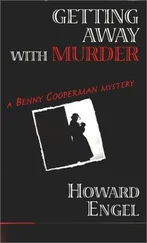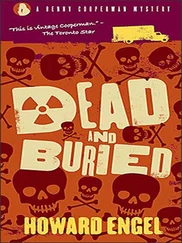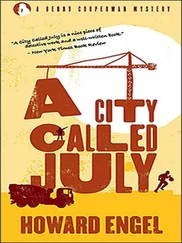Howard Engel - The Cooperman Variation
Здесь есть возможность читать онлайн «Howard Engel - The Cooperman Variation» весь текст электронной книги совершенно бесплатно (целиком полную версию без сокращений). В некоторых случаях можно слушать аудио, скачать через торрент в формате fb2 и присутствует краткое содержание. Год выпуска: 0101, Жанр: Криминальный детектив, на английском языке. Описание произведения, (предисловие) а так же отзывы посетителей доступны на портале библиотеки ЛибКат.
- Название:The Cooperman Variation
- Автор:
- Жанр:
- Год:0101
- ISBN:нет данных
- Рейтинг книги:4 / 5. Голосов: 1
-
Избранное:Добавить в избранное
- Отзывы:
-
Ваша оценка:
- 80
- 1
- 2
- 3
- 4
- 5
The Cooperman Variation: краткое содержание, описание и аннотация
Предлагаем к чтению аннотацию, описание, краткое содержание или предисловие (зависит от того, что написал сам автор книги «The Cooperman Variation»). Если вы не нашли необходимую информацию о книге — напишите в комментариях, мы постараемся отыскать её.
The Cooperman Variation — читать онлайн бесплатно полную книгу (весь текст) целиком
Ниже представлен текст книги, разбитый по страницам. Система сохранения места последней прочитанной страницы, позволяет с удобством читать онлайн бесплатно книгу «The Cooperman Variation», без необходимости каждый раз заново искать на чём Вы остановились. Поставьте закладку, и сможете в любой момент перейти на страницу, на которой закончили чтение.
Интервал:
Закладка:
“You’re not staying the night, then?” Information is power, and information is formed from trifles such as this.
“No, I don’t think I will this time. Maybe later in the summer. How’s the fishing been?” I didn’t know much about fish, but I was able to affect an interest for Mr. Evans. His monosyllabic answers to my questions suggested that he hated the slippery subject. One carton of bad worms could do it to him. Or maybe he just didn’t want to waste his breath on a customer who only wanted to rent a canoe. He slipped his cap over his bald head and headed out the door.
“This way,” he said without turning around. I picked up the pack I’d slipped my maps into and followed him to the side of the marina building, the part that faced away from the dock. “This thing passes for a canoe. She leaves it here. You know how to run ’er?” I could feel that he was going to have fun with me about my naval skills, but he was only going through the motions. There was no audience. As he lifted the green shell with its yellow interior, I could imagine him with an audience of cronies at his back. “You wear shoes like that when you go boating, boy?” The bite was there, but it was only-what’s the word? — perfunctory. Evans didn’t seem to enjoy his work the way Norma McArthur did. What was a strayed puritan doing in vacationland?
While he was feeding the length of the canoe out into the water beside his low dock, I slipped out of my shoes and pulled off my socks. I placed the paddle across the gunwales and placed one foot after the other into the centre of the craft, kneeling with my butt supported by one of the thwarts. I thought that by not sitting in the sternsman’s seat, by playing the rules I remembered from Camp Northern Pine, I might score points even with Ifor Evans. Of course, he’d be the last person in the world to be impressed.
It had been several years since my knees had felt the ribs of a canoe cutting into them. I didn’t try to put a date on it. I still remembered how to twist my paddle stroke at the conclusion of each stroke to keep me going in a straight line. But which straight line? I was heading towards the middle of the headland in front of me, when I heard a shout behind me. Evans was standing on the end of the dock, his cap had been pulled off his head and he was pointing much farther to the right. I waved my thanks and corrected my navigation. I must have got it right, because the next time I looked back at the marina, Evans had vanished.
There wasn’t a lot of water to cut across. I probably could have walked through the woods and got there in about the same time, but this was fun, and there isn’t all that much fun in what I do, so I grab the moments when they appear.
I was on the water for less than twenty minutes. A proper canoeist could have done it in ten, and a powerboat could have sliced half of that time away. I took my heading on a brown inverted V I could see half-buried in greenery. As I got closer, it grew into the sort of cottage I had been expecting. I tried to remember the name she had called it; something with an Indian flavour. A few moments later, I could see a sign: Puckwana. It was painted in fading white on the side of a short cliff on the east end of the property. Between it and a small wooden dock lay a sandy beach. I headed the canoe there and gave a few strong strokes to bring the canoe as far up the beach as possible. I still wet my feet in the chilly sand. I pulled the bow higher out of the water and considered turning the thing over. I didn’t bother: Ifor Evans couldn’t see this far.
The cottage looked about eighty years old, but it was hard to judge such things this far north, where the winters are severe and the maintenance is neglected. It stood about twenty metres back from the shoreline, with bush around all sides, and about the same distance above the lake. I climbed first up that forty-five-degree slant on a path cut into the red soil and marked by whitewashed rocks, and then up rickety steps to the screened-in porch, which wrapped around three sides. I remembered where the keys were hidden and found them without having to send up an S.O.S. flare. Inside the screens, chairs, all high-backed, and some of them rockers, invited the visitor to relax to watch the way the light hits the water from this height.
Inside, I found all of the things that go with a summer cottage in Muskoka. In the large kitchen, there were a leftover icebox and a kerosene refrigerator as well as an electric one. Three stoves told a similar history. The cupboard was as bare as Mother Hubbard’s. The main room, which was bigger than the outside dimensions of the cottage suggested was possible, appeared lined with bookfilled shelves running up well above my head. A fine old library ladder was asking to be rolled effortlessly along the wall. I tried it, and it coasted back to where it had been. I hadn’t noticed the canted pine floor. The books bore the imprints of vanished publishers. A stack of early New Yorker s, pillars of National Geographic s, ghosts from another era such as Colliers, Esquire, Vogue, Life and Look . There were three bedrooms. Two were made up, one topped off with a patchwork quilt, the third stripped, with the mattress rolled at the end of the bedstead. In short, as I said to begin with, this was a very cottagey sort of place: comfortable and without pretension. I liked it. If I wasn’t under the pressure of work, I could easily have settled in. Here, at least, I had all of the books I lacked at the hammock back at the lodge.
The kitchen seemed to be the cottage’s centre of gravity. I could imagine people sitting around the wide pine table discussing the ills of the world over mugs of hot chocolate on a chilly morning or settling the NTC fall schedule over a glass of lager on a balmy day in August. The fridge was clean but, except for a bottle of Smithwick’s beer, empty. What I needed was a bag of milk with a date stamped on it. There was nothing to help me confirm Vanessa’s presence here at the time Renata Sartori was being shot. The foot-pedal garbage can was empty, already lined with a new unsoiled bag. A telephone hung from the wall near the door. There was a dial tone when I lifted it. Nearby, a piece of cardboard had been stapled with names and numbers. I made a note of these and pocketed my jottings. Also nearby, hanging from a finishing nail on the edge of a cupboard, dangled several sets of keys, all very helpfully labelled. One set belonged to a cottage marked “Ed,” others indicated “boathouse,” “generator” and “Johnson 55.”
Outside, I found a few paths. One led to a disused outhouse, which had been modernized in every way except in its plumbing: a citified toilet seat, a vase with dried flowers, even a David Hockney reproduction on the back of the door. Another path led to the boathouse mentioned on the ring of keys. It was high and dry, half hidden in the new spring growth, with a spidery window that looked in on a small fibreglass hull and motor. A low grey structure of peeling paint and cobwebs hid a Delco generator under stunted cedar shrubs. All of the keys but the bunch marked “Ed” were accounted for. On a hunch, I pocketed them. After a last longing look at a couch inside the screened-in porch facing the lake, I walked down the hill to my canoe.
Back at the marina, Ifor Evans was peering into the dark, oily secrets of an outboard motor. I know he heard me coming, but he didn’t turn around. I leaned my back against a warm wall and waited. When he finally looked up, he said, “I thought it would be you.”
He went back into the motor with renewed interest. I picked up a rag and handed it to him the next time he tried to reach for it. I don’t know why I try to be ingratiating, but I’m aware of doing it. It knocks off the rough corners of relationships. Sometimes, it puts me in the way of attracting more business. He took the rag from me and handed it back when he was through with it. I felt a little like an operating-room nurse, trying to outguess the surgeon on what he’d be needing next. I saw the hand reach out again and put the rag back in it.
Читать дальшеИнтервал:
Закладка:
Похожие книги на «The Cooperman Variation»
Представляем Вашему вниманию похожие книги на «The Cooperman Variation» списком для выбора. Мы отобрали схожую по названию и смыслу литературу в надежде предоставить читателям больше вариантов отыскать новые, интересные, ещё непрочитанные произведения.
Обсуждение, отзывы о книге «The Cooperman Variation» и просто собственные мнения читателей. Оставьте ваши комментарии, напишите, что Вы думаете о произведении, его смысле или главных героях. Укажите что конкретно понравилось, а что нет, и почему Вы так считаете.







